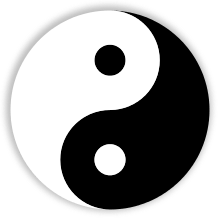Konrad (assassin)
| Part of a series on |
| Taoism |
|---|
 |
|
Deities |
|
Holy places |
|
Organisations |
| Portal Taoism |
Konrad is a fictional character in William Gibson's novel All Tomorrow's Parties. An anonymous and quasi-mystical assassin, Konrad is moved by the Tao in all his actions, heedless of the demands of his employers. He is clad in nondescript clothing and carries a tantō, which he wields with sublime and thoughtless skill. He is haunted by the memory of his lost lover, Lise.
Characteristics
Konrad is portrayed as a mysterious, strangely philosophical corporate assassin.[1] He is described as a retainer for media baron Cody Harwood although his employer does not seem to issue specific orders, nor does Konrad demonstrate a willingness to obey.[2] Thus, Konrad's professional relationship to Harwood is a peculiar one; neither truly needs the other but the relationship is maintained nonetheless for collateral reasons.[3]
That which is overdesigned, too highly specific, anticipates outcome; the anticipation of outcome guarantees, if not failure, the absence of grace.— Konrad, All Tomorrow's Parties[4]
Konrad is described in All Tomorrow's Parties as a slim, middle-aged man with short, grey hair and a vaguely academic resemblance like that of a professor. He wears a dark green woolen coat, dark grey pants, black leather shoes and round, gold-rimmed glasses; similar, then, in appearance to the author himself. In the considered opinion of The Washington Post's reviewer Michael Dirda, Konrad "nearly steals the book away".[5]
Philosophical assassin
Konrad follows the Chinese philosophy of Taoism,[4][6] aligning his movements with the spontaneous, universal energy path of the Tao.[7] Throughout the novel, he continually appeals to the Tao to guide and interpret his actions. Little is revealed about Konrad's past; there are, however, hints of a previous army service (some of his actions are described as 'military') and his nostalgic, jaded view of cities suggests that his work has taken him to many places around the world. The New York Times characterized his perspective as "sentimentalist".[2]
Konrad is trained in the art of Argentine knife-fighting which he learned on a beach in Cuba. His weapon of choice is the tantō, a shorter version of the Japanese katana sword. He carries the tantō concealed under his armpit using a magnetic clip which grasps the blade, leaving the hilt swinging freely. His skill with the weapon is absolute and is continually compared to the sublime, transcendent, thoughtless skill of an enlightened martial artist. Gibson arrived at the character of Konrad through witnessing the serenity, the alert, relaxed presentness, the inner transparent stillness of an FBI sniper[8] he serendipitously encountered.[9]
A chance apophenic glimpse of a stranger stepping onto Market Street, San Francisco (the city in which the novel is set) shortly before he began writing the novel drew the character, and his lost love—a blonde-haired, blue-eyed woman named Lise, whose image haunts Konrad's dreams—from Gibson's imagination:[1]
| “ | Drowned down three decades, she steps fresh as creation from the bronze doors of some brokerage. And he remembers, in that instant, that she is dead, and he is not, and that this is another century, and this quite clearly another girl, some newly minted stranger, one with whom he will never speak. | ” | |
| — William Gibson, All Tomorrow's Parties[9] | |||
See also
- Molly Millions, the fictional razorgirl of Gibson's Sprawl trilogy
- Hubertus Bigend, antagonist of Gibson's later novels
- wu wei, the tenet of natural action that guides Konrad's movements
Footnotes
- 1 2 Keller, John Clark (December 5, 1999). "Gibson's vision of the future just isn't what it used to be". Austin American-Statesman.
- 1 2 "Virtual Novel". The New York Times. November 21, 1999. Retrieved 2008-11-12.
- ↑ Tuttle, William (October 24, 1999). "Gibson's Latest Party Ends A Bit Too Soon". The Seattle Times. Retrieved 2008-11-12.
- 1 2 Poole, Steven (October 30, 1999). "Nearing the nodal". The Guardian. Retrieved 2008-11-13.
- ↑ Dirda, Michael (October 17, 1999). "All Tomorrow's Parties". The Washington Post.
- ↑ Ogden, Stephen (April 4, 2008). "Taoism in "All Tomorrow's Parties"". Ætherture.
- ↑ Thackray, Rachelle (March 27, 2000). "Cyberspace: it's all this man's fault". The Independent. Retrieved 2008-11-13.
- ↑ Gibson, William (July 9, 2012). "Tweet". twitter.com. Retrieved 2012-07-09.
- 1 2 Gibson, William (August 11, 2003). "EXPERIENCE > FICTION". WilliamGibsonBooks.com. Retrieved 2008-11-13.